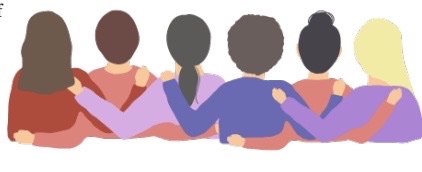We can blame anything and everything for the reason that humans, especially young girls, feel the pressure of eating or not eating. The unfortunate reality is that it’s likely that someone you know has struggled with some form of disordered eating.
The Oxford Dictionary defines an eating disorder as, “any of a range of mental conditions in which there is a persistent disturbance of eating behavior and impairment of physical or mental health.” Because of this foggy definition, categorizing what technically “is” and “isn’t” an eating disorder is difficult.
My point is that unhealthy relationships with food have become so normalized that the line between what is and what isn’t categorized as an eating disorder has become very faint.
An eating disorder can look like anything from someone who skips meals, someone who doesn’t stop talking about how much they ate, or someone who says they feel gross after eating one meal. These are some of the limitless examples of what to look out for in someone who you suspect is struggling with food.
Everyone knows that teens are heavily influenced by one another, while some would call it peer pressure, I believe it’s solely the result of wanting to fit in. Efforts to fit in could span anywhere from the latest fashion trends, hairstyles, drinking, and drugs. How many decisions do you make that only involve you? No outside forces, not even a thought about anyone but yourself. Personally, I would say probably zero.
Disordered eating is also an example of something many teens can easily pick up from their friends. You see your friend not eating lunch, and something in your mind tells you “Oh well if they’re not eating lunch, I probably don’t need it either.”
Don’t get me wrong, I believe that eating disorders can stem from anything, but falling down the wrong path of paying careful attention to who’s eating when, where, and what is highly popular. Poor relationships with food can also be formed as kids when they watch their parent’s diet or eat small amounts of food. It’s important to teach your kids that in order to lose weight you still have to eat.
Eating disorders are unpreventable, but where do we draw the line between being a good friend and being careful not to be affected by someone’s habits?
It’s important to understand that you can be helpful in someone’s journey, but sometimes in order to help yourself you have to stay a certain distance from the problem.
The question everyone reading this should be asking themselves is, how can I help? What do we need to do in order to help someone who is struggling?
There really is no simple answer to this question and sometimes less is more when it comes to helping.
As someone with a lot of experience when it comes to tip-toeing around the blunt reality, here’s my advice:
- Don’t criticize because no one is criticizing them more than themselves. Though it’s difficult to be around, make sure they know that you’re there for them.
- A major issue I’ve seen is the romanticization of disordered eating. As much as some may want it to be, it’s not normal. It should be treated as a real issue, not a joke about how you forgot to eat breakfast in the morning. Small comments can fully affect someone else’s day.
- Note that not everyone’s issues look the same. Undereating is common, but so is binging. Eating disorders come in many different ways.
- You’re likely not going to be able to help them on your own, a lot of times these things are the result of something bigger that’s going on inside someone’s head. Sometimes when everything feels out of control, food is one thing that people have control of over themselves. The really important thing is that if you are going to be spending time with someone who is struggling, you don’t pick up disordered eating habits as well.
Teens struggle with so much and so many things seem out of control throughout adolescence. Check on your friends but also check on yourself to make sure you don’t fall down a similar path.



